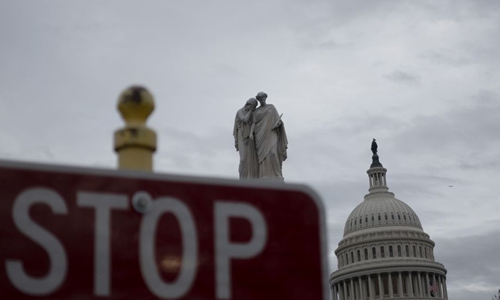US bid to bring Taiwan to WHO table ‘will backfire’
By Yang Sheng Source:Global Times Published: 2020/5/5 20:43:40
Washington desperate for distraction from failure

The Capitol and a stop sign are seen in Washington D.C., the United States, on Feb. 13, 2020. Photo:Xinhua
Trying desperately to distract public attention from its botched coronavirus response, Washington is excessively provoking China on the Taiwan question by helping the island's separatist authority to attend the World Health Assembly (WHA). But analysts said the attempt could backfire and Washington's tricks to pick a diplomatic fight could irresponsibly paralyze WHO in the pandemic.
The WHA is an annual meeting held by the WHO, during which its director-general reports on the WHO's annual work and various topics are discussed. This year's WHA is scheduled to kick off on May 17.
The Trump administration has circulated a draft proposal that would bring Taiwan to the table at the WHO "in an effort to push back against China and punish the global body for being too China-centric," Fox News reported on Tuesday.
Tweets from State Department and US Mission to the UN on Saturday already demanded Taiwan be included in the WHA.
Li Haidong, a professor at the Institute of International Relations of the China Foreign Affairs University, told the Global Times on Tuesday that the US is now trying to increase the presence of Taiwan separatists among the international community to make more trouble for China, as the terrible handling of the COVID-19 outbreak in the US makes Washington look bad.
"Technically, the US and Taiwan separatists are unlikely to achieve any meaningful goal as the US and its allies cannot represent the majority of the international community, and among the members of the WHO, most countries are backing the one-China principle," he said.
Steven Solomon, the WHO's principal legal officer, said on Monday that the WHO recognized the People's Republic of China as the only "legitimate representative of China", in keeping with UN policy since 1971, and that the question of Taiwan's attendance was one for the WHO's 194 member states, Reuters reported.
Two WHO members have proposed discussing Taiwan's participation during this year's WHA, a WHO officer said on Monday, although he did not specify which two members, Taiwan-based media CNA reported on Monday.
Li Xiaobing, a Taiwan studies expert at Nankai University in Tianjin, said that although China has enough influence and international support to safeguard its sovereignty in the WHO, the US and its allies could possibly use some tricks to break the rules of the organization and unilaterally put Taiwan's representatives into the assembly.
"That could paralyze the WHA and even force other members to deal with debates that have nothing to do with the pandemic. The diplomatic and political struggles would seriously interrupt public health affairs, which should be the theme of the assembly, and this is a dangerous and highly irresponsible move by the US," Li Xiaobing said.
The Trump administration's performance in handling the pandemic is extremely poor and more than 1.18 million people in the US have been infected, so it is trying its best to find other issues to distract public attention, and helping Taiwan separatists join the WHO or WHA is one of those tricks, Li Xiaobing noted.
The Trump administration's national security team is even considering the creation of a new global health organization - one that would have more US influence - among a range of options, Fox News reported.
However, the US can't even win the support of its closest allies to punish the WHO. According to the Guardian on April 16, US President Donald Trump found himself isolated among Western leaders at a virtual G7 summit, as they expressed strong support for the WHO after the US's suspension of its funding.
From 2009 to 2016, when the pro-reunification party KMT's authority ruled the island, Taiwan participated in the WHA as an observer under the name "Chinese Taipei," which was permitted by the Chinese mainland because the two sides of the Taiwan Straits have the 1992 Consensus that recognized the one-China principle.
Since 2017, after the separatist Democratic Progressive Party took power and abandoned the 1992 Consensus, the cross-Straits relationship has been seriously damaged and the island's authority has lost the right to attend the WHA as an observer. However, the normal rights of Taiwan's public health sectors to cooperate with the WHO and the Chinese mainland for information and technology sharing have not been affected at all, according to Chinese mainland foreign affairs and Taiwan affairs departments.
Li Xiaobing warned that if the US excessively provokes China on the Taiwan question, which directly challenges China's core interests and sovereignty, it could leave China with no choice but to respond with decisive actions, including military operations, to send deterrent signals to separatism, and the regional peace and stability of the West Pacific would be jeopardized.
Li Haidong agreed that the US might believe it can make trouble for China by playing the "Taiwan card," but China has the overwhelming advantage to decide when and how to solve the Taiwan question once and for all, so it is very unwise and dangerous for the US to use the island to provoke China.
Newspaper headline: US’ Taiwan push to backfire
Posted in: DIPLOMACY